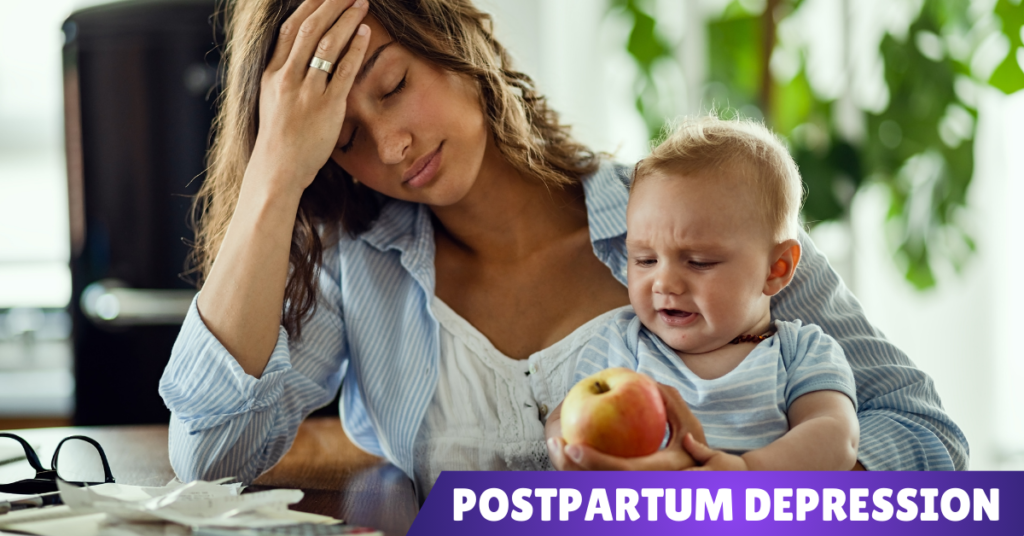Mansi first came to my counseling center during her pregnancy, filled with a mix of excitement and a little worry, as she was expecting her first baby. After some mindfulness techniques and counseling sessions with her and her caregiver, she began to feel more at ease and was able to enjoy her pregnancy with joy and anticipation.
At that point, it may have seemed like Mansi’s concerns were relatively common and manageable. However, the real challenge emerged after her delivery. While in the hospital, Mansi found herself unable to carry her newborn daughter and would frequently call the nurse for even the smallest tasks. She began experiencing intense anxiety, coupled with negative self-talk. Her nights were filled with anxiety, leading to feelings of worthlessness and guilt for not being able to care for and bond with her daughter as she had hoped.
Mansi’s struggle with persistent fatigue, lack of energy, and difficulty bonding with her baby were clear signs of early postpartum depression. When her caregiver brought her back to my center, I recognized these symptoms as the initial stages of postpartum depression. Through counseling and interpersonal therapy, Mansi was able to overcome these challenges, and she is now leading a joyful life with her daughter.
This experience underscores the importance of caring for a mother’s mental well-being as well as her physical health after delivery, as her overall well-being is crucial for both her recovery and the health of her baby.
Postpartum depression (PPD) is a complex mix of physical, emotional, and behavioral changes that occur in some women after giving birth. It’s a type of major depression that can begin shortly after childbirth, though it can also develop up to a year later. PPD is not just the “baby blues,” which are milder and typically resolve within two weeks. PPD is more severe and long-lasting, requiring treatment.
In this section, we will explore postpartum depression, including its signs and symptoms, causes, and available treatments:-
- Family and upbringing
- Culture and society
- Education
- Religion and spirituality
- Personal experiences
- Peers and social circles
- Media and technology
- Self-reflection and critical thinking
Symptoms of Postpartum Depression
Persistent sadness or feeling empty
Anxiety or feeling overwhelmed
Irritability or anger without a clear reason
Difficulty bonding with the baby
Crying spells often with no apparent reason
Loss of interest in activities you used to enjoy
Feelings of worthlessness or guilt
Sleep disturbances, such as insomnia or excessive sleeping
Appetite changes, leading to weight loss or gain
Fatigue or lack of energy
Thoughts of harming yourself or the baby
Causes and Risk Factors
The exact cause of PPD is not fully understood, but it is believed to be due to a combination of hormonal, emotional, and environmental factors.
Risk factors include:
- History of depression or other mental health conditions
- Stressful life events during pregnancy or after childbirth
- Lack of a strong support system
- Complications in childbirth
- Difficulties breastfeeding
- Being a first-time mother
Treatment for Postpartum Depression
Treatment is essential for recovery and can include:
Counseling or Therapy
Cognitive-behavioral therapy (CBT) and interpersonal therapy (IPT) are commonly used.
Medication
Antidepressants can be effective, but they should be prescribed and monitored by a healthcare provider, especially if the mother is breastfeeding.
Support Groups
Joining a group of other mothers experiencing PPD can provide comfort and reduce feelings of isolation.
Lifestyle Changes
Regular exercise, a healthy diet, and sufficient sleep can support recovery.
Importance of Seeking Help
If you or someone you know is experiencing symptoms of postpartum depression, it’s important to seek help. Untreated PPD can affect the mother’s health and her ability to care for the baby, and it can also impact the child’s development.

